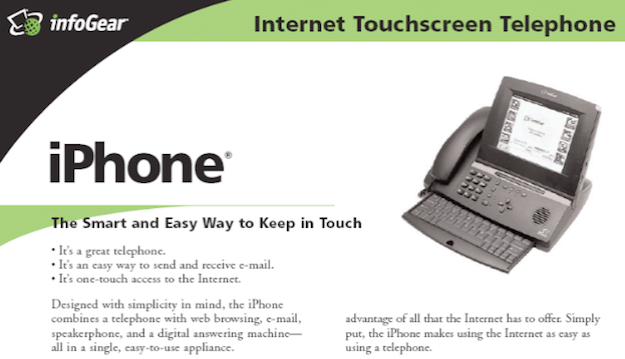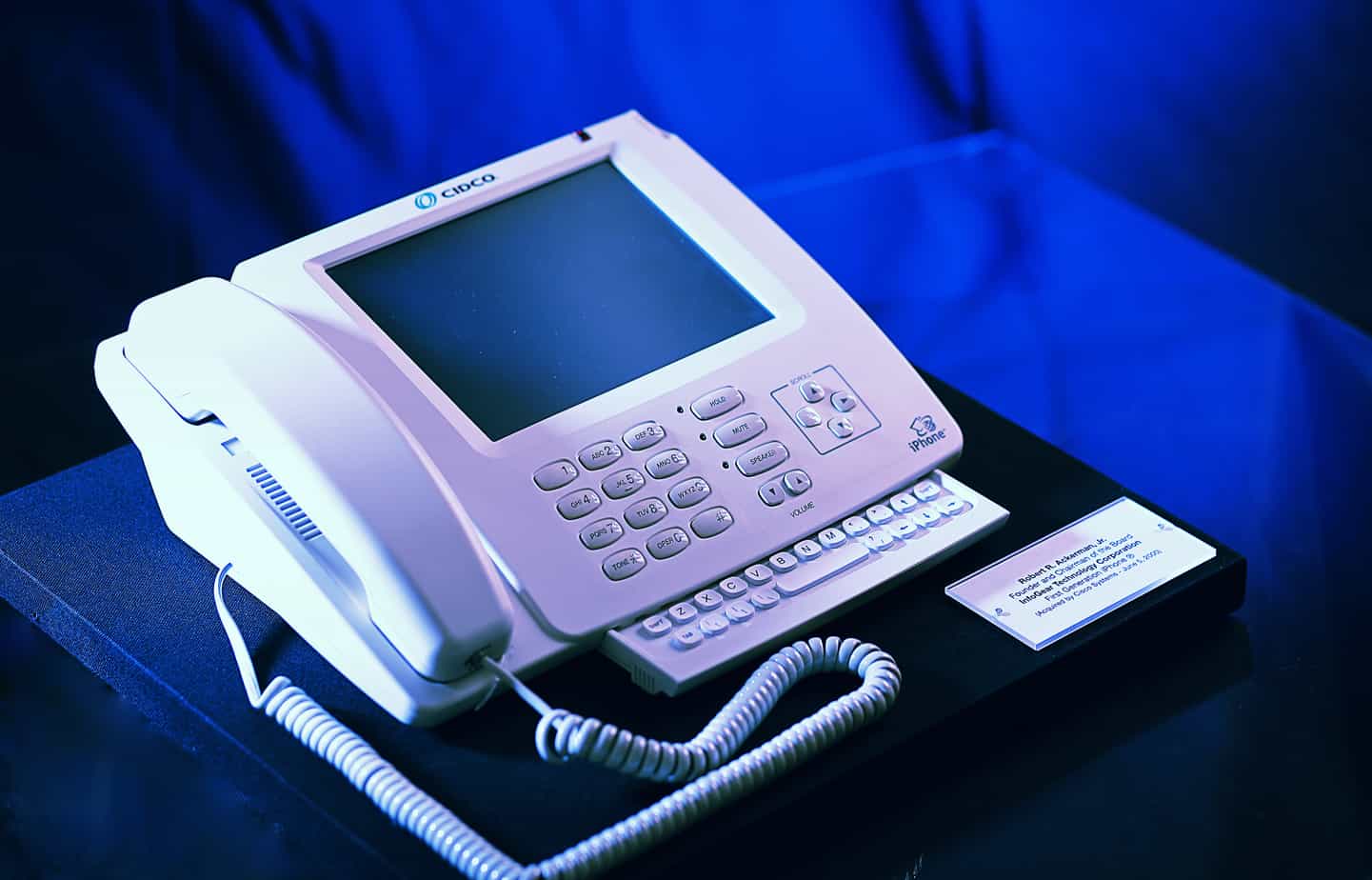 February 21, 2007: Apple comes to an agreement with Cisco over the iPhone trademark, which Cisco legally owns but Apple wants to use.
February 21, 2007: Apple comes to an agreement with Cisco over the iPhone trademark, which Cisco legally owns but Apple wants to use.
Under the agreement, both companies get to use the iPhone trademark on products throughout the world. The two businesses also dismiss outstanding lawsuits against one another, and agree to “explore opportunities for interoperability in the areas of security, and consumer and enterprise communications.”
It’s a classic bit of Steve Jobs steamrolling the opposition.
This post contains affiliate links. Cult of Mac may earn a commission when you use our links to buy items.
iPhone trademark: How Apple’s phone got its name
Apple’s iPhone rules the smartphone world, but there was another iPhone that is considerably less well-known. While Apple first began giving its products the “i” prefix with the launch of the iMac G3 in 1998, the “i” in that case stood for “internet.” However, Apple left things sufficiently vague that it could use the prefix for later non-connected products like the first-gen iPod.
The same year Apple launched the iMac G3, a company called InfoGear launched its own touchscreen home phone that it called the “iPhone.” In the late 1990s, a trend emerged of “internet appliances” designed to allow users to check email or browse the web without using their home computers. It was a bit like today’s “internet of things” devices, but without the finesse.
National Semiconductor’s Project Mercury leads to InfoGear’s iPhone
As revealed in an intriguing article by the Internet History Podcast, the InfoGear iPhone grew out of a skunkworks project at National Semiconductor called “Project Mercury.” It eventually became a product called the iPhone.
Venture capitalist Robert Ackerman — who helped bring it to market — revealed the origins of the name.
“The way we came at it is, we looked at the telephone as being the original information appliance,” Ackerman said. “This was the evolution of the original information appliance — on steroids. So, iPhone was internet-phone … information-phone.”
(It’s worth noting that, a bit like the “2000” suffix, using the prefix or suffix “i” wasn’t unique in the 1990s. There was also the website iVillage, NBC’s internet portal NBCi, AOL’s iGolf channel and more.)
InfoGear iPhone brings some firsts

Photo: InfoGear
InfoGear first showed off its iPhone at the Consumer Electronics Show in 1998. It wasn’t cheap, with a price tag of $499 and extra charges for internet access. However, it offered some exciting advances, including visual voicemail, basic apps and a very early use of touch technology.
The idea was that the InfoGear iPhone would “co-exist with PCs much as the microwave co-exists with a conventional oven.”
The device was well-reviewed and ultimately sold around 100,000 units. But, as with many internet appliances at the time, the technology simply wasn’t there yet to make the InfoGear iPhone indispensable.
Cisco then acquired InfoGear, along with the iPhone trademark. Cisco stopped releasing products named “iPhone” in 2001, although it hung onto the trademark.
Apple considers building a cellphone
Apple, for its part, had been considering some version of the iPhone for a long time before unveiling its first handset in 2007. In fact, Apple acquired the domain name www.iphone.org on December 14, 1999, prompting years of speculation the company was considering building a cellphone.
If there was any other name Apple could have gone with, that ended when the iMac G3, the iBook, the iPod and the iTunes Store became back-to-back-to-back hits. From Apple’s perspective, the “i” prefix was as recognizable as any other brand it owned.
Steve Jobs muscles in on iPhone trademark
What happened next was audacious, though. Knowing that Cisco owned the trademark, Apple nonetheless went ahead and introduced the iPhone in January 2007. The following day, Cisco filed suit against Apple.
Adam Lashinsky detailed Jobs’ outrageous handling of the situation in his book Inside Apple:
“[Charles Giancarlo, a Cisco executive at the time,] fielded a call directly from Steve Jobs. ‘Steve called in and said that he wanted it,’ Giancarlo recalled. ‘He didn’t offer us anything for it. It was just like a promise he’d be our best friend. And we said, “No, we’re planning on using it.”‘ Shortly after that, Apple’s legal department called to say they thought Cisco had ‘abandoned the brand,’ meaning that in Apple’s legal opinion Cisco hadn’t adequately defended its intellectual property rights by promoting the name.
…
The negotiation displayed some classic Steve Jobs negotiating tactics. Giancarlo said Jobs called him at home at dinnertime on Valentine’s Day, as the two sides were haggling. Jobs talked for a while, Giancarlo related. ‘And then he said to me, “Can you get email at home?”‘Giancarlo was taken aback. This was 2007, after all, when broadband Internet was ubiquitous in homes in the US, let alone that of a Silicon Valley executive who had worked for years on advanced Internet technology. ‘And he’s asking me if I’m able to get email at home. You know he’s just trying to press my buttons — in the nicest possible way.’ Cisco gave up the fight shortly after that.”
Another Apple-Cisco deal for iOS
As if this wasn’t enough, Apple later “borrowed” another big Cisco trademark — IOS (which Cisco used for its Internet Operating System). Again, Apple got its way. The promised Cisco-Apple team-up to “explore opportunities for interoperability” didn’t end up happening, either.
Did you ever see one of InfoGear’s original iPhones? Do you remember the “internet appliances” of the 1990s? Leave your recollections below.


